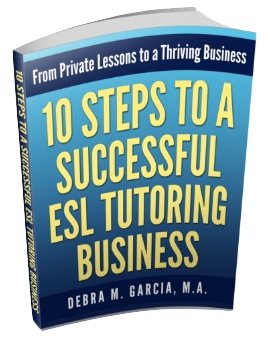Tips for Future Perfect Lesson Plans
How to Teach the Future Perfect Tense
Future Perfect lesson plans are appropriate for advanced English language learners and, possibly, for high intermediate students.
This verb tense is usually pretty difficult for ESL and EFL students to master. One of the reasons is that it isn't used as frequently as other tenses, even by native English speakers.
Lesson plans for the Future Perfect tense should include (1)
conjugation, (2) form, and (3) function(s) of the tense. Of course, not
all of these components need be taught in the same lesson. For a
thorough discussion on how to teach verb tenses, see Teaching ESL Verb Tenses.
Future Perfect Verb Conjugation
The Future Perfect is constructed this way:
The conjugation is fairly simple. Only the subject changes. Here are some examples with the subject pronouns I, you, he/she/it, they and we.
- I will have talked. I will have walked. I will have danced. I will have eaten.
- You will have talked. You will have walked. You will have danced. You will have eaten.
- She/He/It will have talked. She/He/It will have walked. She/He/It will have danced. She/He/It will have eaten.
- They will have talked. They will have walked. They will have danced. They will have eaten.
- We will have talked. We will have walked. We will have danced. We will have eaten.
ESL cloze exercises can be used for Future Perfect lesson plans to reinforce conjugation and past participle usage.
Future Perfect Verb Form (five forms the ESL student must learn)
- Affirmative Usage (I will have studied. You will have studied. She/He/It will have studied. They will have studied. We will have studied.)
- Negative Usage (I won't have traveled. You won't have traveled. She/He/It won't have traveled. They won't have traveled. We won't have traveled.)
- Yes/No Questions (Will I have spoken? Will you have spoken? Will she/he/it have spoken? Will they have spoken? Will we have spoken?)
- Short Answers (Yes, I will. No, I won't. Yes, you will. No, you won't. Yes, she/he/it will. No, she/he/it won't. Yes, they will. No, they won't. Yes, we will. No, we won't.)*
- WH- Questions (e.g., When will she have studied? Where will you have traveled? How will they have lost weight?)
*Note: "Have" is sometimes added to the Short Answer form; e.g., Yes, I will have. No, I won't have.
Function of Future Perfect Tense
The Future Perfect is used to express an activity that will be completed
by another time or event in the future. It's usually used with a time
clause, for example, "by the time" or "by next week." If the time clause
uses a verb, it will use the Present Simple tense.
Here are some examples:
- By the time I finish dinner, you will have eaten two desserts!
By the time she sees her son again, he will have been in Afghanistan for two years.
She will have studied English for six months by the time she leaves for the United States.
We will have learned all the ESL verb tenses by the end of the semester.
ESL Student Challenges
Future Perfect lesson plans focusing on verb conjugation can include
cloze (fill-in-the-blanks) exercises. The challenge here will be using
the correct past participle for irregular verbs. So if your focus is teaching ESL/EFL students the proper conjugation, it may be best to use regular verbs first.
Overall, ESL students have trouble using this tense easily and effectively because they don't get enough practice using it. It's one of the last tenses taught (actually, it's usually next to the last tense taught). When students start new ESL classes, the teacher often has to review the previous tenses. So by the time students leave the class, the teacher may not have had time for Future Perfect lesson plans.
Additional ESL Resource
Azar's, Understanding and Using English Grammar
is an excellent textbook for helping prepare Future Perfect lesson
plans, as well as all other tenses. It has exercises and excellent
explanations. I use it regularly with my high intermediate and advanced
ESL students.
From Future Perfect Lesson Plans
to Teaching ESL to Adults Home Page


New! Comments
Have your say about what you just read! Leave me a comment in the box below.